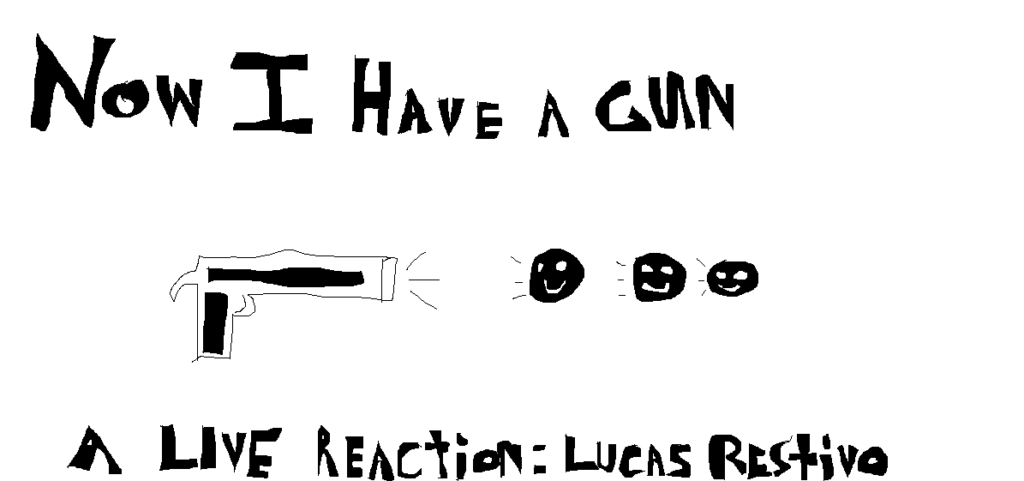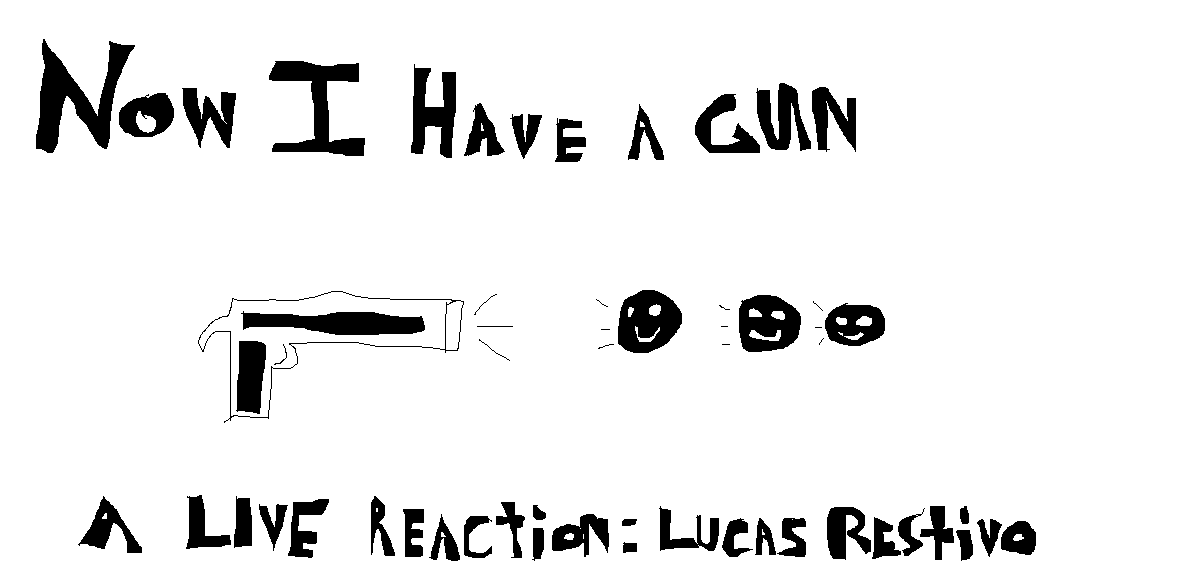
Now I Have A Gun: A Live Reaction

Now I Have A Gun: A Live Reaction
Preamble: I came across Graham Irvin after back patio offered his last book, liver mush, for free and I was about to go on a road trip. I reviewed it on Misery Tourism. I found the book structurally surprising, inventive, and smart and the poems having a Brautigan-esqe charm.
Since then, I’ve followed Graham parasocially online, reading the occasional poem or story he puts out there, including his viral poem, “Hey Man I’m In Town For A Few Days Let’s Grab A Drink” which to me is and will be an enduring capture of the literary moment; something between a tweet and a poem, with the expediency of the former and the power of the latter. I’ve been looking forward to reading this book since Rejection Letters announced it. Graham sent me an arc a little while back.
Section I
Four poems into section one and feeling an ease and “ocean” to his work. Thinking “Graham is a special writer.” Enjoying how this book feels more immediately inviting while still toying with the subjectivity of language; gun means gun and hope and power and gun means love. I like how he uses the image to reckon with domination culture, instincts to dehumanize, and desire for heroism.
The boldness of the pedophile image surprises with conflicting feelings, especially when the pedophile’s pet dies. Reminds me of a David Berman poem in the Baffler that uses the image of a weeping Nazi. Something about (de)humanizing. Feeling like the crux of being American is tapped into. Cool steel, safety, and blood. Joy and terror.
Finding myself agreeing with Zac smith’s blurb– it’s shocking we haven’t seen this premise brought to life before.
I’m thinking about image and effect. Feeling like the narrator is guiding you and/or maybe himself, to ask, what causes a feeling? If I position x image in y way, will that elicit response? What makes you do anything? Because you want to? Is there a gun off screen? Writers will like these passages.
Getting the image of a focus group director strong-arming an audience with Amazon gift cards. It’s not imagist, objective poetry creating subconscious mirrors nor confessional poetry that keeps difficult emotions company. It’s something new, somewhere between bit and essay, poem and tweet, poetry and prose. Or maybe I haven’t read enough.
Section II
Reminds me of Tao Lin in a way. Not in the language but in a sort of Information Age response. Where a book reports its curiosity back from niche bookshelves and internet corners and academic journals. A curatorial utility. Though without a compelling enough writer, I’d probably just get bored and I’m not here.
Section III
The tone shift here is a real moment. A brief interiority of a narrator who is mostly looking outward so far. I’m wondering what Graham can’t do as a writer and sort of laughing at myself at the grandiosity of that feeling.
Rupi Kaur line breaks of the narrator snapping back to his proscribed reality of “art must be real”.
Section IV
Starts with a short story I previously read somewhere on the internet. It’s cool if not for nothing else in breaking tempo and lending a jazz-like freedom to the book as a whole. It leaves me thinking: poetry should be less about poetry and it will be more poetic.
Feeling a sort of synchronistic exasperating unsureness about art and utility at the same time as reading the story of the narrator’s grandfather, war, masculinity, honor, and the meaning of things. Feels meaningful in a rejuvenating way. Also probably the first interesting thing I’ve read about grandparents in a long time.
Section V
A poem that I think I read previously in back patio that at the time solidified that I should read everything Graham publishes.
Section VI
I google and learn what “ad antiquitatum” means. Feel intriguing and instinctive opposition to the idea that having lots of kids and teaching them your ideology only will further your ideology, in the long run at least. Kids like doing the opposite of what they’re indoctrinated with, at least temporarily, I think.
Enjoying the narrator playing with the idea of the present tense, though I didn’t think this part needs the addendum that the narrator is kidding around about shooting the reader and then potentially himself because of the previously mentioned idea that the present tense in a book isn’t actually the present tense of the person writing the book. Taste thing. Still fun to read.
Instinctively drawn to critiques of academia but I am trying to challenge this in myself. Half-feelingly feel that the gun metaphor may be constraining an interesting idea of theft, scholarship, and discovery.
Section VII
Begins with a poem with maybe my favorite part of the collection so far:
“if I haven’t killed myself
good luck buddy
there’s no way
you can prove me wrong”
I love this poem. Makes me think about ego in relation to attraction and destruction, and desire. Taps into a relatable feeling that even when I’ve been wrong maybe I’ve also been sort of right because I’m still alive? Funny.
I remember reading something Logo Daedalus said, maybe an observation on communication from raising his newborn child. He said something like all conversation is ultimately a yes or no and to find acceptance in that. Maybe I’m imposing that last part. But this memory and feeling is conjured up in the last lines of section seven:
“I want to simplify all interactions to, “Fuck that,” or
“Hey man, nice gun.”
Section VIII
The narrator is losing the plot of his gun metaphor and I enjoy relating to this feeling.
Picking up a pattern in the book of an idea followed by a sort of literal definition/cataloging of what the idea is supposed to mean followed by a reinterpretation or rather a realistic definition that can’t be abridged by our concept of definitions.
Finding myself scrolling past the exposition-y parts of these set ups to where the narrator injects perspective. Which is funny because the narrator calls out and encourages that desire to skim after a long chunk of cataloging mass shootings by definition. The intentionality is clever but maybe not super compelling to me? Maybe my trouble with metanarratives. Something about language and storytelling as a way to inject new feeling and thought, and metanarratives feeling like a dissolution of that capacity? Or maybe a backdoor into that capacity? As I’m now thinking about all that? Still in a meta sense, which is maybe all storytelling and anything not experienced firsthand? All thought? Feeling a little schizophrenic freshman stoner-y, in a nice way.
Section IX
Haikus which make me laugh after this whole internal diatribe about narrative, metanarrative, and feeling. Returning to a form of feeling. I love that. Really smart. One gun shooting another gun. Brilliant.
Okay gonna slop down final thoughts: This is exceptional and I’ve never read anything like it and I know people say that about everything but this time it is true. I enjoyed this in a time where I haven’t enjoyed many things I’ve read lately. I don’t understand how writers make money or accumulate audience but Graham deserves a big check. And you deserve to read something this wonderful and new and inspiring.